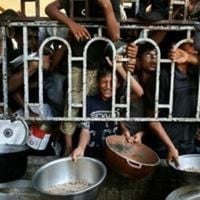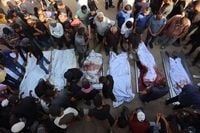Gaza City, once a bustling heart of Palestinian life, now echoes with the sounds of bombardment and the cries of those caught in a relentless humanitarian crisis. As Israeli tanks edge closer to the city’s densely populated neighborhoods, the threat of a full-scale military operation looms large, leaving residents with an impossible choice: stay and risk certain danger, or flee into the unknown with little hope of safety.
On August 21, 2025, the Israeli military intensified its campaign, pounding Gaza City overnight. According to Reuters and multiple agencies, this escalation came just before a high-level meeting between Prime Minister Benjamin Netanyahu and his ministers to discuss plans to seize control of the enclave’s largest city. The Israeli government’s resolve was underscored by the call-up of 60,000 reservists—a move signaling that, despite mounting international condemnation, the operation would likely proceed.
The humanitarian toll is staggering. The Gaza Health Ministry reported that at least 70 Palestinians had been killed by Israeli fire in the preceding 24 hours, including eight people—among them a Fatah leader and members of his family—in the Sabra suburb of Gaza City. The violence has forced thousands to abandon their homes, with many seeking shelter along the coast or moving southward, hoping to escape the shelling that has turned once-familiar neighborhoods into battle zones.
“We are facing a bitter-bitter situation, to die at home or leave and die somewhere else, as long as this war continues, survival is uncertain,” said Rabah Abu Elias, a 67-year-old father of seven, in a conversation with Reuters. The sense of despair was palpable on the streets, where hundreds of residents staged a rare protest, carrying banners that read “Save Gaza, enough” and “Gaza is dying by the killing, hunger and oppression.” Palestinian journalist Tawfik Abu Jarad, speaking at the march, declared, “This is for a clear message: Words are finished, and the time has come for action to stop the military operations, to stop the genocide against our people and to stop the massacres taking place daily.”
Yet, the violence is only one facet of Gaza’s agony. Hunger now stalks the population with the same ruthlessness as the bombs. According to Gaza’s Health Ministry, two more Palestinians died of starvation and malnutrition in the 24 hours prior to August 21, 2025, bringing the total to 271 deaths from such causes since the war began—including 112 children. The following day, the death toll from Israeli attacks rose to 71, further compounding the tragedy.
The United Nations has now officially declared famine in Gaza, a grim milestone that underscores the severity of the crisis. As reported by multiple agencies, more than half a million Palestinians—over one-fifth of Gaza’s population—are facing “catastrophic famine conditions, which include starvation, destitution and death.” The UN’s classification system left little doubt: Gaza’s hunger crisis has crossed the threshold into a full-blown disaster.
Philippe Lazzarini, Commissioner-General of the UN Relief and Works Agency for Palestine Refugees (UNRWA), has been among the most vocal in sounding the alarm. Addressing the Geneva Press Club on August 21, Lazzarini warned, “If no measures are taken immediately, they are certainly condemned to death.” He painted a harrowing picture of the situation, noting that UNRWA health centers had seen a sixfold increase in the number of severely malnourished children since March 2025—particularly in northern Gaza, where an estimated one million people remain.
“People in the Palestinian territory are already dying of hunger and there will be more, there’s no doubt about it,” Lazzarini told reporters. Without naming Israel directly, he described the famine as both “manufactured and fabricated,” declaring, “Food has been used as an instrument of war.” He added that the population, already weakened by months of deprivation, would likely not survive a new major military operation in Gaza City. “We had described hell on Earth in Gaza,” he said. “If this scenario were to unfold, even if we talk about the evacuation of people from Gaza to the south, many will no longer even have the strength to move.”
The Israeli military, for its part, has begun issuing warnings to medical and international organizations operating in northern Gaza. Military spokesperson Avichay Adraee posted on X (formerly Twitter) that Gaza City residents should prepare to move south, and that hospitals in southern Gaza should brace for an influx of patients from the north. A Gaza Health Ministry official confirmed these warnings, but insisted that authorities had no intention of evacuating hospitals—arguing that such a move would endanger the lives of hundreds of thousands of people.
Amid this chaos, some international actors have attempted to provide relief. The United Arab Emirates, in cooperation with Jordan and with support from Germany, France, the Netherlands, Singapore, and Indonesia, conducted its 77th air drop of essential aid to Gaza on August 21. Since the launch of the “Birds of Goodness” initiative in November 2023, more than 4,028 tonnes of aid have been delivered by air, according to the UAE Ministry of Defense. Emirati charitable organizations have played a key role in these efforts, aiming to alleviate the suffering of civilians trapped in what many now describe as a war zone with no escape.
Still, the scale of need far outpaces the aid delivered. The global hunger monitor’s May report warned that half a million Gazans faced starvation even before the term “famine” was officially invoked. Now, with the UN’s declaration, the international community faces renewed pressure to act. Lazzarini’s words ring with a sense of urgency: “A population that is extremely weak will be confronted with a new major military operation. Many of them will not survive.”
Meanwhile, diplomatic efforts to halt the violence remain fraught. Hamas has accepted a proposal for a 60-day ceasefire and a prisoner exchange—offering to release 10 living captives and 18 bodies in exchange for the release of about 200 long-serving Palestinian prisoners held by Israel. As of August 21, Israel had yet to officially respond to the offer, and the call-up of tens of thousands of reservists suggested that a negotiated pause remained elusive.
The situation on the ground grows more desperate by the day. As tanks roll closer and the threat of mass displacement increases, Gaza’s residents are left to weigh impossible choices. For many, as Rabah Abu Elias lamented, “To leave Gaza City or not isn’t an easy decision to make.” The world watches as Gaza teeters on the brink, its people caught between war, hunger, and a future that grows more uncertain by the hour.
For now, the only certainty is that the crisis in Gaza has entered a new, even more perilous phase—one defined not just by bombs and bullets, but by the slow, grinding toll of hunger and despair.



